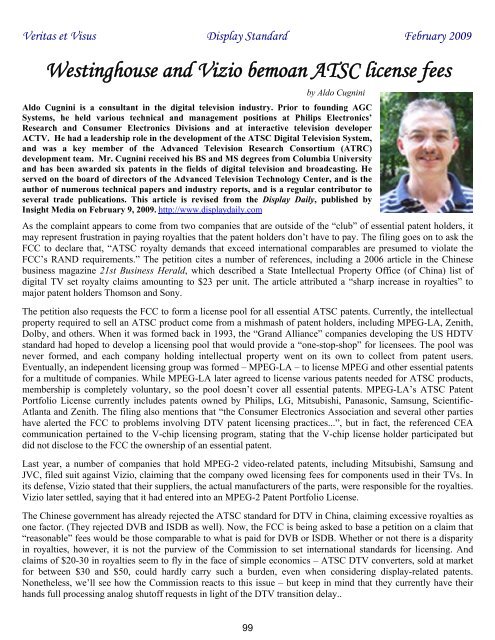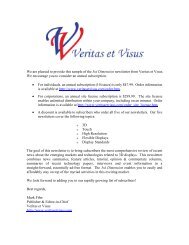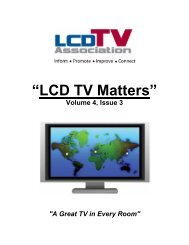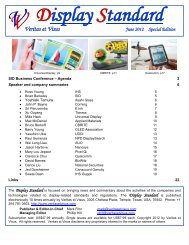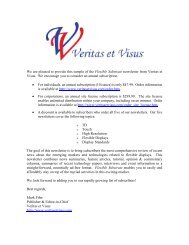Create successful ePaper yourself
Turn your PDF publications into a flip-book with our unique Google optimized e-Paper software.
<strong>Veritas</strong> <strong>et</strong> <strong>Visus</strong> <strong>Display</strong> <strong>Standard</strong> February 2009<br />
Westinghouse and Vizio bemoan ATSC license fees<br />
99<br />
by Aldo Cugnini<br />
Aldo Cugnini is a consultant in the digital television industry. Prior to founding AGC<br />
Systems, he held various technical and management positions at Philips Electronics’<br />
Research and Consumer Electronics Divisions and at interactive television developer<br />
ACTV. He had a leadership role in the development of the ATSC Digital Television System,<br />
and was a key member of the Advanced Television Research Consortium (ATRC)<br />
development team. Mr. Cugnini received his BS and MS degrees from Columbia University<br />
and has been awarded six patents in the fields of digital television and broadcasting. He<br />
served on the board of directors of the Advanced Television Technology Center, and is the<br />
author of numerous technical papers and industry reports, and is a regular contributor to<br />
several trade publications. This article is revised from the <strong>Display</strong> Daily, published by<br />
Insight Media on February 9, 2009. http://www.displaydaily.com<br />
As the complaint appears to come from two companies that are outside of the “club” of essential patent holders, it<br />
may represent frustration in paying royalties that the patent holders don’t have to pay. The filing goes on to ask the<br />
FCC to declare that, “ATSC royalty demands that exceed international comparables are presumed to violate the<br />
FCC’s RAND requirements.” The p<strong>et</strong>ition cites a number of references, including a 2006 article in the Chinese<br />
business magazine 21st Business Herald, which described a State Intellectual Property Office (of China) list of<br />
digital TV s<strong>et</strong> royalty claims amounting to $23 per unit. The article attributed a “sharp increase in royalties” to<br />
major patent holders Thomson and Sony.<br />
The p<strong>et</strong>ition also requests the FCC to form a license pool for all essential ATSC patents. Currently, the intellectual<br />
property required to sell an ATSC product come from a mishmash of patent holders, including MPEG-LA, Zenith,<br />
Dolby, and others. When it was formed back in 1993, the “Grand Alliance” companies developing the US HDTV<br />
standard had hoped to develop a licensing pool that would provide a “one-stop-shop” for licensees. The pool was<br />
never formed, and each company holding intellectual property went on its own to collect from patent users.<br />
Eventually, an independent licensing group was formed – MPEG-LA – to license MPEG and other essential patents<br />
for a multitude of companies. While MPEG-LA later agreed to license various patents needed for ATSC products,<br />
membership is compl<strong>et</strong>ely voluntary, so the pool doesn’t cover all essential patents. MPEG-LA’s ATSC Patent<br />
Portfolio License currently includes patents owned by Philips, LG, Mitsubishi, Panasonic, Samsung, Scientific-<br />
Atlanta and Zenith. The filing also mentions that “the Consumer Electronics Association and several other parties<br />
have alerted the FCC to problems involving DTV patent licensing practices...”, but in fact, the referenced CEA<br />
communication pertained to the V-chip licensing program, stating that the V-chip license holder participated but<br />
did not disclose to the FCC the ownership of an essential patent.<br />
Last year, a number of companies that hold MPEG-2 video-related patents, including Mitsubishi, Samsung and<br />
JVC, filed suit against Vizio, claiming that the company owed licensing fees for components used in their TVs. In<br />
its defense, Vizio stated that their suppliers, the actual manufacturers of the parts, were responsible for the royalties.<br />
Vizio later s<strong>et</strong>tled, saying that it had entered into an MPEG-2 Patent Portfolio License.<br />
The Chinese government has already rejected the ATSC standard for DTV in China, claiming excessive royalties as<br />
one factor. (They rejected DVB and ISDB as well). Now, the FCC is being asked to base a p<strong>et</strong>ition on a claim that<br />
“reasonable” fees would be those comparable to what is paid for DVB or ISDB. Wh<strong>et</strong>her or not there is a disparity<br />
in royalties, however, it is not the purview of the Commission to s<strong>et</strong> international standards for licensing. And<br />
claims of $20-30 in royalties seem to fly in the face of simple economics – ATSC DTV converters, sold at mark<strong>et</strong><br />
for b<strong>et</strong>ween $30 and $50, could hardly carry such a burden, even when considering display-related patents.<br />
Non<strong>et</strong>heless, we’ll see how the Commission reacts to this issue – but keep in mind that they currently have their<br />
hands full processing analog shutoff requests in light of the DTV transition delay..


